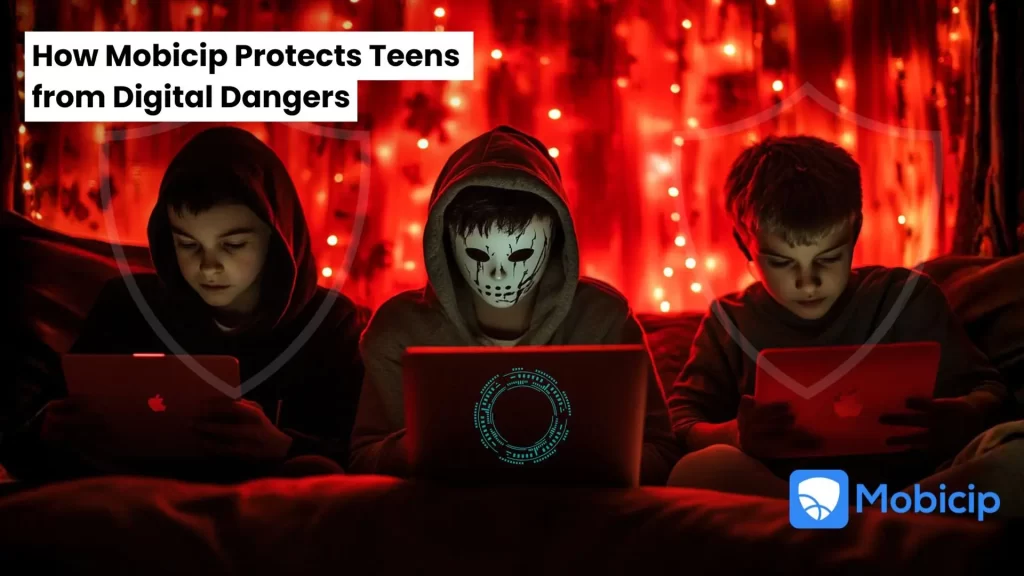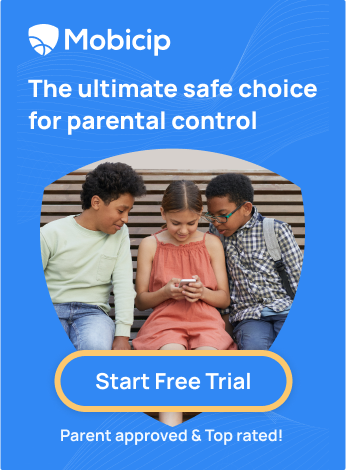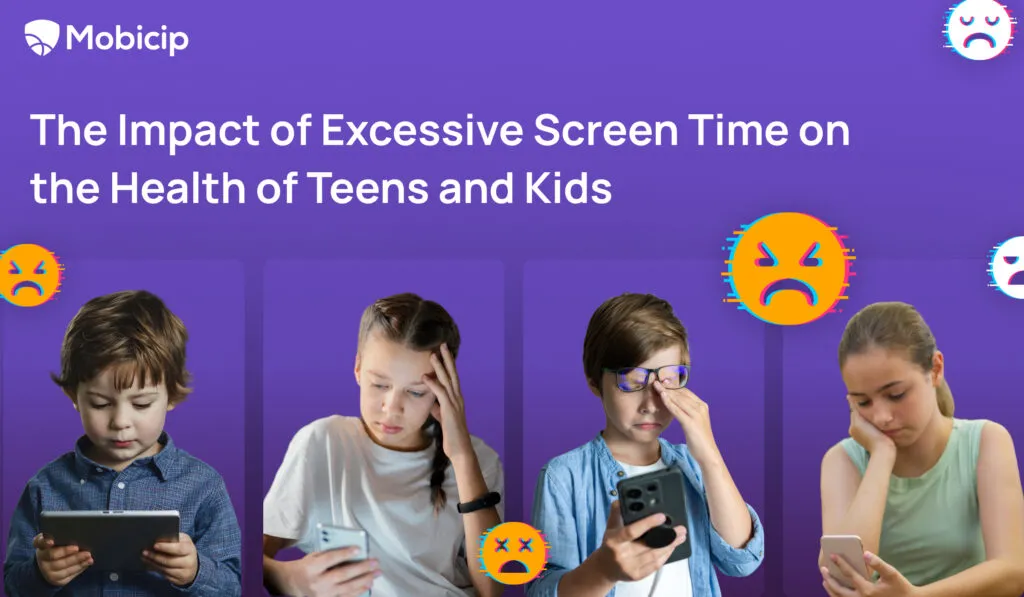Screen Time Hacks Teens Use and How Mobicip Stops Them

Screen time hacks or “cheats” are tricks kids use to get around safety controls like screen time limits, parental control tools, or monitoring apps on their devices. These include changing time zones, using VPNs, or using hidden browsers. Teens may employ these tricks, making it hard for parents to enforce healthy digital habits. Even well-intentioned users may sometimes use these tricks impulsively, in moments of weakness, to quickly bypass their own digital limits.
This is where Mobicip steps in, offering comprehensive smart features that guarantee robust screentime solutions.

Read on to know how Mobicip keeps you one step ahead
Common Screen Time Hacks
Changing Time Zones or Device Clocks
Kids can manipulate systems to reset daily limits, primarily by changing the device’s time zone or clock. By this, the screentime resets as well.
Using Guest Mode or Factory Reset
Factory resetting one’s device or entering guest mode can sometimes result in the device’s settings and screen time limits being reset or erased.
App Cloning or Parallel Apps
Teenagers can sometimes clone apps or download duplicate versions to use the one without limits, helping them evade monitoring.
Browser-Based Access
Incognito mode or an alternate browser is sometimes used to bypass app-level filters.
Using School Devices or Friends’ Phones
Common-use computers and tablets can be used to circumvent home-based controls entirely. They may also use friends’ devices.
Uninstalling Apps: The Most Common Screen Time Hacks
Mobicip and other similar apps can be deleted or uninstalled if not locked down. This would disconnect the device from monitoring entirely.
The Risks of Unchecked Screen Time
Unchecked screen time can have several ill effects on the overall well-being of young people.
Mental health impacts
One of the most concerning impacts of unchecked technology use on young people is its effect on mental health. Researchers have linked constant social media use to increased symptoms of anxiety and depression. This can be primarily due to reduced self-esteem, heightened FOMO, and an overload of information. The blue light emitted by phone screens can also disrupt sleep patterns.
Academic decline
Unchecked screentime can also take a toll on academic performance. This report by the UK Education Committee observed that while online educational tools proved useful avenues for learning, increased screen time created barriers to effective focus and affected children’s memory, processing, language, and executive abilities.
Exposure to inappropriate content
It’s easy for children to encounter violent or explicit content online in addition to mis- and disinformation. The report mentioned above also observed that 79% of children online came across violent pornography before turning 18 and that 81% of girls between the ages of 7 and 21 experienced threatening behaviour online.
Social isolation
Excessive screentime can lead to real-world social isolation. Psychology Today said about the link between screen usage and loneliness: “Social technologies used to escape the social world and withdraw from social anxiety escalate feelings of loneliness.” It further mentions the decrease in offline interactions and their replacement with virtual spaces that may oftentimes be more shallow and less fulfilling.
Thus, unbridled screentime can undermine a child’s mental, physical, and academic well-being. This is why it’s essential to set limits and checks in place to guide their digital use until they’re old enough to do it themselves.
Tips for Parents to Stay Ahead of Teen Screen Time Hacks
Mobicip offers a unique way to monitor and curb screentime through a comprehensive, robust service that users cannot easily override.

Some features include:
App Blocking
With Mobicip, parents can block certain apps and websites that may be inappropriate or limit screentime on them. Mobicip also prevents its uninstallation and the disabling of various limits without parental PIN.

Browser Filtering and Incognito Mode Blocking
Mobicip enforces safe browsing by filtering web content across all major browsers, automatically blocking inappropriate or harmful sites. It also disables or restricts incognito and private browsing modes, preventing users from accessing the internet without monitoring or leaving activity untracked.

Multi-Device Monitoring
Mobicip tracks digital usage across multiple devices, including phones, tablets, and laptops. By simply connecting these devices to the platform, parents can access a comprehensive and expansive service.

Real-Time Alerts and Reports
Mobicip sends instant notifications of suspicious activity to parents’ devices and provides weekly reports of online activity.

Customizable Schedules and App Limits
Mobicip provides granular control over app usage and screen time with customizable schedules and app limits, offering a tailored online experience that matches every family’s needs.

Tips for Parents to Stay Ahead of Teen Screen Time Hacks
While hacks and “cheats” can be concerning and counterproductive, parents should avoid being too heavy-handed when addressing them. The more parents police their children, the more evasive their children might become, resorting to outright dangerous activity in some cases. The first step must always be communication, where parents discuss the importance of screentime checks and understand why their children may be violating these limits. A well-rounded approach to digital activity, where parents go beyond setting rules and provide a safe space for their wards to discuss a range of issues, helps shape a balanced approach to healthy digital use. Here are some tips for parents to stay ahead of hacks online:
Encourage open conversations about screen time
Explaining to children the dangers of limitless screentime and the need for checks and balances is important. This way, families can negotiate screen allowances together and create a system that works for everyone.
Use Mobicip’s parent dashboard regularly
Mobicip provides parents with a variety of information about their family’s online activity. The system sends parents weekly reports with overviews of their children’s screentime, website activity, and app usage. Engaging with these reports and the various other comprehensive features can help parents understand how to use the app to their best advantage.

Combine tech tools with offline engagement
Parents can encourage their children to pursue offline activities, such as sports or art. They can also promote family time by spending time with their children — playing games, going out together, eating together, etc.
Stay updated on new digital trends and hacks
Parents can stay informed about online trends and what their kids may be encountering. A great place for parents to begin is Mobicip’s own blog, which offers practical tips and insights on managing screen time effectively. They can also stay aware of any hacks their children might use to bypass screentime limitations and talk to their children about these should they suspect something amiss.

Conclusion
As children grow, it’s natural that they are curious and strive, or even fight to be independent. Caregivers often find themselves stretched between giving them roots and letting them fly. What they see as guidance, children may see as control. So, where should the line be drawn?
Parents need to guide their youngsters to use technology mindfully, not fearfully. Tools like Mobicip make that journey smoother by giving parents both control and insight—so boundaries become less about restriction and more about responsibility. With open conversations, consistent guidance, and the right digital support, families can turn screen time challenges into opportunities to connect, learn, and grow together in today’s connected world.





